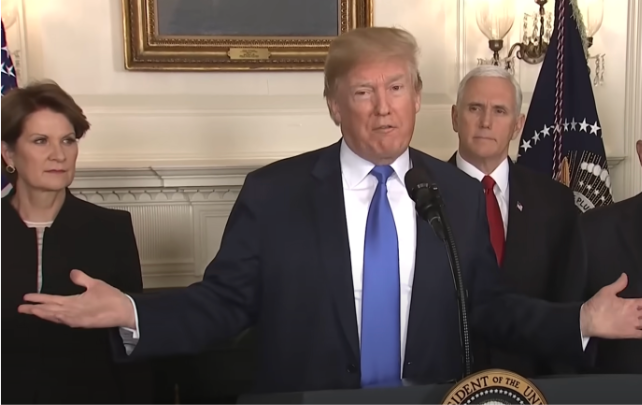News
Team Trump Looking to Declare National Economic Emergency to Justify Sweeping Tariff Plans

Source: YouTube
President-elect Donald Trump is reportedly considering declaring a national economic emergency to implement his sweeping tariff program. According to sources, the move would allow Trump to invoke the International Economic Emergency Powers Act (IEEPA) and grant him broad authority to impose tariffs without requiring national security justifications. This potential decision is already affecting markets, with stock futures slipping amid rising uncertainty.
Trump's tariff strategy has been a cornerstone of his campaign. During his first term, he imposed tariffs on over $360 billion worth of Chinese goods, targeting industries like steel and aluminum. Now, he’s pushing for universal tariffs that could range from 10% to 25% on critical imports. However, critics argue that such measures could have far-reaching economic consequences.
Who Actually Pays for Trump’s Tariffs?
While Trump’s administration promotes tariffs as a means to rebuild U.S. manufacturing, the financial impact often falls on American consumers and businesses. Tariffs on imports raise the cost of goods, and these price increases typically trickle down to consumers. Kimberly Clausing, a trade economist, points out that most U.S. imports are intermediate goods used in manufacturing supply chains. “Making these imports more expensive raises production costs for American firms, hindering their global competitiveness,” Clausing explains.
Historical examples also highlight this dynamic. In 2018, Trump’s tariffs on Chinese steel led to higher costs for U.S. manufacturers, which subsequently raised prices on consumer goods like cars and appliances. Additionally, retaliatory tariffs from trading partners harmed American exporters and created a ripple effect that extended beyond U.S. borders. Economists warn that similar outcomes could occur with the proposed universal tariffs, further straining the economy.
Legal Battles Loom Over Tariff Plan
Trump’s team is exploring various legal mechanisms to justify the tariffs. Besides IEEPA, they are considering Section 338 of U.S. trade law, which allows retaliatory tariffs against nations that discriminate against U.S. commerce. Another option involves invoking Section 301, the statute used for the initial tariffs on China. However, these alternatives may require lengthy investigations and could face legal challenges along the way.
The potential declaration of a national economic emergency is already drawing criticism from trade groups and lawmakers. Business lobbyists, including the Chamber of Commerce, have signaled their intent to challenge the move in court. The group cited the economic strain tariffs could impose on American businesses and consumers. In addition, critics argued that a broad use of emergency powers to enforce trade policies could set a concerning precedent, potentially leading to legal confrontations.
How Tariffs Could Shake Markets and Raise Prices
The news of Trump’s tariff plans has started spooking financial markets. Stock futures dipped following the announcement, and analysts warned of potential inflationary effects if the tariffs take effect. Higher import taxes could lead to increased prices for essential goods and exacerbate existing inflation concerns. Unfortunately, this scenario would hit low-income households the hardest, as they spend a larger proportion of their income on necessities.
Additionally, market volatility is likely to rise as investors grapple with the uncertainty surrounding the implementation of tariffs. Some analysts fear that these policies could weaken consumer confidence, dampen business investment, and slow economic growth. With the Federal Reserve already signaling caution about persistent inflation, the timing of this policy could further strain the economy.
Will Trump's Tariffs Reshape the U.S. Economy?
While Trump’s tariffs aim to bolster domestic industries, they also risk sparking trade disputes and slowing economic growth. Supporters argue that tariffs can revitalize American manufacturing and reduce dependency on foreign supply chains. They believe this shift would enhance national security and provide long-term economic benefits.
However, detractors highlight the potential for retaliation from trading partners, which could lead to reduced access to global markets for American exporters. In sectors heavily reliant on international trade, such as agriculture and technology, these tariffs could result in significant financial losses.
If implemented, the tariffs may lead to short-term gains for specific sectors but could undermine long-term economic stability. Experts caution that a comprehensive evaluation of both domestic and global implications is essential before proceeding. For now, Americans should prepare for potential price hikes and market volatility as Trump’s administration finalizes its trade policies.
Do you support declaring a national economic emergency to implement Trump’s sweeping tariff agenda?




1 Comment
I don’t think most people completely understand the tariff process. I also don’t believe people truly inform themselves and research before they vote. Very sad.